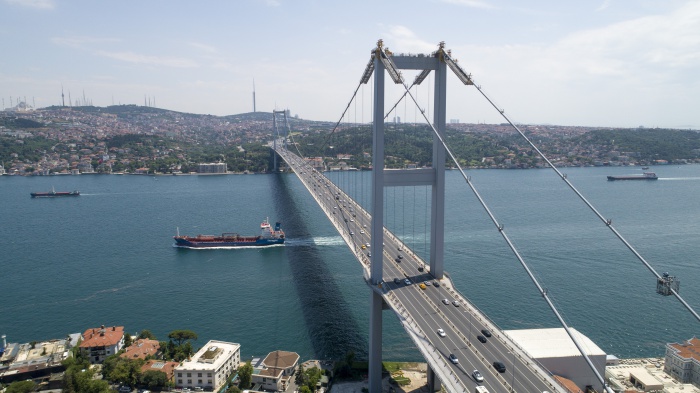Turkey’s decision to close the Bosporus and Dardanelle straits in the early months of the war in Ukraine was pivotal in stopping Russia’s naval forces from executing plans to seize the cities of Odessa and Mykolaiv, according to Vasyl Bodnar, Ukraine’s former ambassador to Turkey in a recent interview.
Reflecting on his three-year tenure in Ankara during an interview with Ukrinform on Nov. 24, Bodnar emphasized the strategic importance of Turkey’s actions. “We sank the ‘Moskva’ and two other Russian cruisers that were in the Mediterranean,” he said. “I believe that Turkey’s closure of the straits prevented Russia from using its naval advantage to seize Odessa, Mykolaiv and other territories that, according to Moscow’s plans, were supposed to be occupied as a result of naval operations.”
The closure of the Bosporus and the Dardanelle straits, in line with the Montreux Convention, seemingly played a significant role in thwarting Russian military ambitions.
The Montreux Convention was negotiated in 1936 to regulate passage through the straits, placing limits on the passage of civilian vessels and military warships. While the convention generally promotes freedom of navigation, Turkey retains the ability to close the straits to warships from belligerent countries in the event of war or the probability of imminent war. According to Article 19 of the convention, binding on Turkey, in the event of war, Turkey shall close the straits to the belligerents’ warships: “In time of war …[v]essels of war belonging to belligerent Powers shall not, however, pass through the Straits except in cases arising out of the application of Article 25 …”
Recognizing Russia’s invasion of Ukraine as a “war,” Turkey closed the Bosporus and Dardanelle straits to Russian and Ukrainian warships, invoking Article 19 of the convention.
Former Turkish Foreign Minister Mevlüt Çavuşoğlu revealed that on Feb. 27–28, Russia informed Turkey of its intention to deploy the Slava-class guided missile cruisers Varyag and Marshal Ustinov from the Eastern Mediterranean through the straits to the Black Sea. However, Turkey requested that Russia refrain from submitting a formal passage request, citing Article 19 of the Montreux Convention. As a result, the Moskva cruiser was the only vessel in the Black Sea capable of providing air defense for Russian ships that could launch an attack on Odessa to seize the port city or surrounding area.
On April 13, 2022, Ukrainian forces targeted the Russian warship Moskva with two domestically developed Neptune anti-ship missiles, striking it near Snake Island, in the Black Sea. The Moskva was built during the Soviet era and entered the Soviet Navy in 1982 as one of three Slava-class guided-missile cruisers. The loss of the Moskva warship forced Russia to abandon any plans for an amphibious operation aimed at capturing Odessa. As the flagship of the Black Sea fleet, the Moskva played a critical role in providing air defense for naval and amphibious units, and its destruction left Russian forces vulnerable to counterattacks, effectively halting any ambitions to seize the strategic port city or nearby territory.
Bodnar led the Ukrainian embassy in Ankara for three years, following his prior role as Ukraine’s deputy foreign minister. Bodnar has now been appointed Ukraine’s ambassador to Poland.
